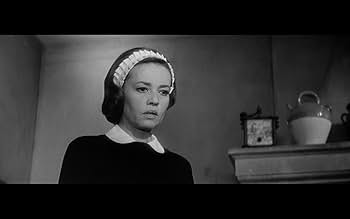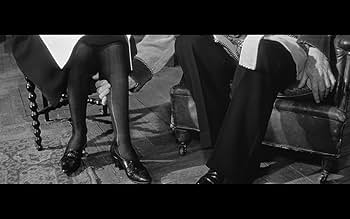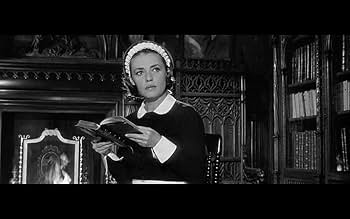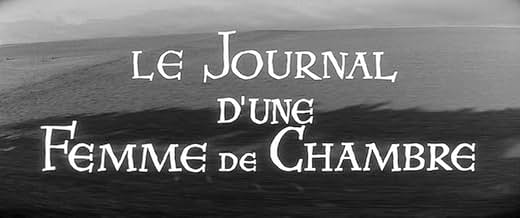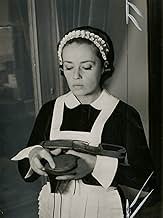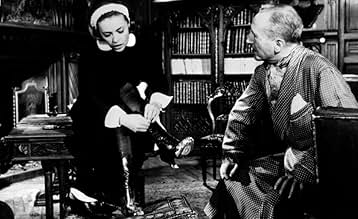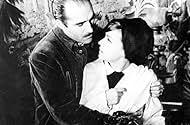IMDb-BEWERTUNG
7,4/10
10.185
IHRE BEWERTUNG
Füge eine Handlung in deiner Sprache hinzuA sophisticated and self-assured woman from Paris joins a middle-class rural estate as a maid and causes quite a stir among the variously uptight, perverse and violent inhabitants.A sophisticated and self-assured woman from Paris joins a middle-class rural estate as a maid and causes quite a stir among the variously uptight, perverse and violent inhabitants.A sophisticated and self-assured woman from Paris joins a middle-class rural estate as a maid and causes quite a stir among the variously uptight, perverse and violent inhabitants.
- Regie
- Drehbuch
- Hauptbesetzung
- Auszeichnungen
- 1 Gewinn & 2 Nominierungen insgesamt
Empfohlene Bewertungen
The best thing about Bunuel is his ruthless lucidity, and it's thoroughly on display here. All his films start from the conviction that no one is to be pitied - or even if they are, Bunuel, like life, will not oblige, and neither the audience nor the person concerned should expect it of them. Which is not to say that all abuses are right - the film postulates that between fascist and violent criminal there is little difference, and then, true to lucid form, makes it clear at the end that evil does *not* automatically bring about its own destruction; a fact not to be lamented but fought over. Bunuel said he thought it was his most erotic film. It's not an unreasonable claim. There's not a single sex scene. Go figure.
A young woman reports to work as a chambermaid at the residence of an eccentric family in the French countryside. Moreau is fine as the maid, a strong-willed woman who attracts the attention of practically every man in the household and neighborhood. Geret as a servant and Piccoli as the testosterone-laden man of the house also turn in notable performances. In one of his more accessible films, Bunuel creates some beautiful imagery with his wide-screen black and white cinematography. However, the script is uneven, with the plot point concerning the rape and murder of a child mixing uneasily with the political and comedic elements. The conclusion is abrupt and unsatisfying.
Bunuel's 'Diary Of A Chambermaid' was released in between two of his surreal masterpieces 'The Exterminating Angel' and 'Simon Of The Desert'. It is, on the surface at least, a lot more conventional as either of those, maybe that's why it doesn't get as much attention as it deserves. I don't know why it is rarely mentioned when people discuss the very best of Bunuel, but for me it's almost as great as 'Viridiana' and 'Belle De Jour'. The story was previously filmed by Renoir in the 1940s, but I haven't seen that version, so I can't say how different Bunuel's approach to the material is. As Bunuel claimed not to have seen it either I don't feel so bad. Jean Moreau, the beautiful star of Truffaut's 'Jules And Jim' and countless other Euro art film favourites, gives a brilliant performance as the enigmatic Celestine, maid to The Monteils, a very odd family living in pre-War France. Bunuel includes some of his usual comments about sexual deviance, and France's future under the Nazi occupation haunts the whole film, but what is most interesting to me about the picture is its subtlety and ambiguity. Like 'Belle De Jour' I think each repeated viewing will reveal more, and opinions on its meaning will depend on the individual viewer. Personally I'm still exploring Bunuel's extraordinary body of work. It is exciting doing so. I've probably only seen a third of his output so far, but I've yet to see a movie made by him that is less than fascinating. 'Diary Of A Chambermaid' just might be his most underrated film. I highly recommend it.
In the 30's, the witty, literate and quite sophisticated chambermaid Céléstine (Jeanne Moreau) comes from Paris to work for the dysfunctional Monteil family in the country, more specifically for the fetishist on shoes and maniac for cleaning Monsieur Rabour (Jean Ozenne). His daughter and mistress of the house Madame Monteil (Françoise Lugagne) is a frigid and arrogant woman, and her husband, Monsieur Monteil (Michel Piccoli), is a hunter and also a wolf with their maids. Their fascist and rude worker Joseph (Georges Géret) feels a sexual attraction for Céléstine, but she repels him. Their neighbor, Captain Mauger (Daniel Ivernel), has a problem with the Monteils and dumps his garbage in their yard, but Céléstine talks to him and is motive of gossips. When Monsieur Rabour unexpectedly dies, Céléstine quits her job but while in the train station, she finds that the girl Claire was found raped and murdered by the police. Céléstine returns to her job convinced that Joseph killed the little girl and trying to find evidences against him.
"Le Journal d'une Femme de Chambre" is a delightful movie of undefined genre drama, black comedy, adventure? where Luis Buñuel again exposes fight of classes, hypocrisy of both the bourgeois and the working class, a historical moment in France with the fascism growing, the ridiculous role of the clerical and an unsolved murder case. The story is centered in Céléstine, but the motives why a woman with her profile accepts a job in a rural area is never clear. The identity of the rapist and killer of Claire is also not disclosed, there is only a strong insinuation that Joseph killed the girl. The story is very ironic, like for example when Monsieur Monteil is informed that Céléstine and Joseph will marry and requires the sexual favors from Marianne; or the weird fetishism of Monsieur Rabour; or the priest asking for a new roof for the church to Madame Monteil; or the conclusion with Captain Mauger changing his will and serving the mistress and smart Céléstine on their bed. My vote is seven.
Title (Brazil): "O Diário de uma Camareira" ("The Diary of a Chambermaid")
"Le Journal d'une Femme de Chambre" is a delightful movie of undefined genre drama, black comedy, adventure? where Luis Buñuel again exposes fight of classes, hypocrisy of both the bourgeois and the working class, a historical moment in France with the fascism growing, the ridiculous role of the clerical and an unsolved murder case. The story is centered in Céléstine, but the motives why a woman with her profile accepts a job in a rural area is never clear. The identity of the rapist and killer of Claire is also not disclosed, there is only a strong insinuation that Joseph killed the girl. The story is very ironic, like for example when Monsieur Monteil is informed that Céléstine and Joseph will marry and requires the sexual favors from Marianne; or the weird fetishism of Monsieur Rabour; or the priest asking for a new roof for the church to Madame Monteil; or the conclusion with Captain Mauger changing his will and serving the mistress and smart Céléstine on their bed. My vote is seven.
Title (Brazil): "O Diário de uma Camareira" ("The Diary of a Chambermaid")
This is my favorite Buñel film. The story is stunningly presented, an absolute work of art, unbelievably subtle but always concrete. It is like a great symphony: every note is perfect.
Surprisingly (considering the title) Le journal d'une femme de chambre is not about sex, nor is it a journal for that matter. It is about politics, sexual politics of course, but also domestic politics, manor politics, and nation-state politics. The time is the thirties as fascism moves toward its mesmerizing stranglehold on a decadent Europe. The place is France (Normandy, I imagine) where the republicans hold power. In the streets are those who would be brown suits and among them is Joseph (Georges Geret), groundskeeper for a petite bourgeois family of degenerate eccentrics. He is an incipient Nazi, a xenophobic anti-Semitic man who worships brute force, an ignorant man that every French movie-goer knows will be a Nazi-collaborator once France is under the occupation.
The story is seen from the point of view of Celestine, a chambermaid of some sophistication (and an abiding, but understandable duplicity), a Parisian who has come to work for the family in the country. She is played by the incomparable Jeanne Moreau of the plastic face, a woman of many guises, many moods and an ability to depict with a glance any emotion. She is a great star of the French stage and screen who plays the part effortlessly, with finesse and a fine subtlety. The screenplay by Buñel and the brilliant Jean-Claude Carriere (who penned so many outstanding films, Bell de Jour (1967), The Discreet Charm of the Bourgeoisie (1972), Valmont (1989), The Ogre (1996), etc.) is an adaptation of the novel by Octave Mirbeau. There is a Hollywood film of the same name starring Paulette Goddard, Burgess Meredith and Judith Anderson, directed by Jean Renoir that I haven't seen, released in 1946. I understand the treatment was more comedic and conventional.
Surrealist Luis Buñel's film is perhaps best described as a comédie noire, a genre antecedent to the familiar (and somewhat similar) film noir. In the latter the comedy is usually incidental and there is no attempt at any great philosophic or symbolic significance. Here Buñel not only makes a statement about the nature of the relationship between bourgeois Europe in the thirties and fascism, but even delves into the primeval nature of women and gives us a sharp look at a woman's place in bourgeois society. Celestine is duplicitous because she has to be to survive. She uses men the way the society uses her.
Be sure and pay close attention to the final scene inside and outside the café and consider the implications of what is being shown. What is being suggested? Will Joseph finally get the punishment he so richly deserves? Or did Celestine make the choice she made out of fear? Is the union between Joseph and Celestine symbolic of that between the fascists and Europe?
For those interested in this last theme I highly recommend Vittoria De Sica's brilliant The Garden of the Finzi-Continis (1971).
(Note: Over 500 of my movie reviews are now available in my book "Cut to the Chaise Lounge or I Can't Believe I Swallowed the Remote!" Get it at Amazon!)
Surprisingly (considering the title) Le journal d'une femme de chambre is not about sex, nor is it a journal for that matter. It is about politics, sexual politics of course, but also domestic politics, manor politics, and nation-state politics. The time is the thirties as fascism moves toward its mesmerizing stranglehold on a decadent Europe. The place is France (Normandy, I imagine) where the republicans hold power. In the streets are those who would be brown suits and among them is Joseph (Georges Geret), groundskeeper for a petite bourgeois family of degenerate eccentrics. He is an incipient Nazi, a xenophobic anti-Semitic man who worships brute force, an ignorant man that every French movie-goer knows will be a Nazi-collaborator once France is under the occupation.
The story is seen from the point of view of Celestine, a chambermaid of some sophistication (and an abiding, but understandable duplicity), a Parisian who has come to work for the family in the country. She is played by the incomparable Jeanne Moreau of the plastic face, a woman of many guises, many moods and an ability to depict with a glance any emotion. She is a great star of the French stage and screen who plays the part effortlessly, with finesse and a fine subtlety. The screenplay by Buñel and the brilliant Jean-Claude Carriere (who penned so many outstanding films, Bell de Jour (1967), The Discreet Charm of the Bourgeoisie (1972), Valmont (1989), The Ogre (1996), etc.) is an adaptation of the novel by Octave Mirbeau. There is a Hollywood film of the same name starring Paulette Goddard, Burgess Meredith and Judith Anderson, directed by Jean Renoir that I haven't seen, released in 1946. I understand the treatment was more comedic and conventional.
Surrealist Luis Buñel's film is perhaps best described as a comédie noire, a genre antecedent to the familiar (and somewhat similar) film noir. In the latter the comedy is usually incidental and there is no attempt at any great philosophic or symbolic significance. Here Buñel not only makes a statement about the nature of the relationship between bourgeois Europe in the thirties and fascism, but even delves into the primeval nature of women and gives us a sharp look at a woman's place in bourgeois society. Celestine is duplicitous because she has to be to survive. She uses men the way the society uses her.
Be sure and pay close attention to the final scene inside and outside the café and consider the implications of what is being shown. What is being suggested? Will Joseph finally get the punishment he so richly deserves? Or did Celestine make the choice she made out of fear? Is the union between Joseph and Celestine symbolic of that between the fascists and Europe?
For those interested in this last theme I highly recommend Vittoria De Sica's brilliant The Garden of the Finzi-Continis (1971).
(Note: Over 500 of my movie reviews are now available in my book "Cut to the Chaise Lounge or I Can't Believe I Swallowed the Remote!" Get it at Amazon!)
Wusstest du schon
- WissenswertesThis is Luis Buñuel's only film in the anamorphic widescreen format.
- PatzerAt the train station, Célestine is supposed to be returning to Paris but she's waiting on the wrong side of the tracks: In one shot, one can clearly read "Direction Paris" on the other side.
- VerbindungenFeatured in A propósito de Buñuel (2000)
Top-Auswahl
Melde dich zum Bewerten an und greife auf die Watchlist für personalisierte Empfehlungen zu.
- How long is Diary of a Chambermaid?Powered by Alexa
Details
Box Office
- Weltweiter Bruttoertrag
- 126 $
- Laufzeit1 Stunde 37 Minuten
- Farbe
- Sound-Mix
- Seitenverhältnis
- 2.35 : 1
Zu dieser Seite beitragen
Bearbeitung vorschlagen oder fehlenden Inhalt hinzufügen

Oberste Lücke
By what name was Tagebuch einer Kammerzofe (1964) officially released in India in English?
Antwort
